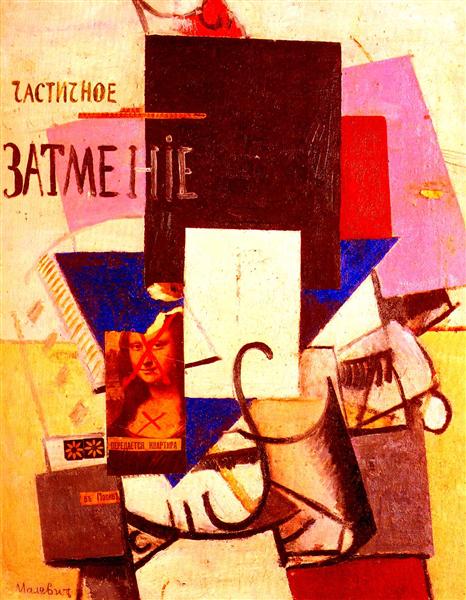Description
When analyzing "Composition with the Lisa Mona" of 1914, by Kazimir Malevich, we are faced with a work that challenges visual conventions and symbolizes the spirit of the Russian avant -garde of the twentieth century. This painting, made in a context of creative explosion and search for new forms of expression, is a clear example of the complexity and depth of suprematism, an artistic movement to which Malevich focused with passion.
The work itself is an amalgam of geometric shapes, contrasting tones and a symbolism that invites a deep reflection on the representation and renown of classical art within a modern framework. The first thing that highlights is the inclusion of a fragment of the famous portrait of Leonardo da Vinci, "La Mona Lisa", incorporated almost subversively into this abstract composition. This resource for appropriation is not merely decorative, but it serves to create a dialogue between the old and the modern, between the representative and the abstract, in an attempt of Malevich to transcend the limitations of figurative art.
The painting is characterized by a frantic use of lines and colors that intersect and collide. The monochromatism of some fragments is contrasted with other sectors of more vivid and saturated colors, which gives the work an internal dynamic. The geometric shapes, mostly rectangular and diagonal, seem to float and overlap in an abstract space that denies the traditional perspective. This emotionally active chaos is not random; It is one of the distinctive characteristics of suprematism that seeks to express the supremacy of pure artistic sensibility.
In color terms, the work ranges between white and dominant blacks, complemented by red explosions and touches of green, blue and yellow. This limited, but effective palette underlines Malevich's intention to focus on the form and structure, rather than the representative content. The color game also adds an emotional and psychological component to the composition, which can be interpreted as a meditation on dislocation and harmony in the context of the socio -political changes of its time.
It is crucial to observe that the inclusion of the face of the Mona Lisa, although partially and stylistically altered, adds an extra meaning. Malevich is not only playing with a cultural icon, but is also commenting on the nature of perception and the value of art in the modern era. By fragmenting and recontextualizing this icon, Malevich challenges the sacredness of classical art and proposes a new way of seeing, where deconstruction can lead to a new form of appreciation.
Kazimir Malevich, as founder of suprematism, was determined to bring art to a more spiritual and less material domain. In "Composition with the Lisa Mona", we see a conscious effort to go beyond the visible and tangible, to penetrate the kingdom of the transcendental and the philosophical. The work invites us to rethink not only aesthetics, but also the purpose and functionality of art in a constant change.
This painting, Therefore, it is more than a simple amalgam of shapes and colors; It is a visual manifesto of Malevich's radical aspirations and its desire to transform the collective perception of art. In this sense, "composition with Mona Lisa" is a key piece to understand not only suprematism, but also the broad panorama of European modernism and its enduring impact on the development of contemporary art.
KUADROS ©, a famous paint on your wall.
Hand-made oil painting reproductions, with the quality of professional artists and the distinctive seal of KUADROS ©.
Art reproduction service with satisfaction guarantee. If you are not completely satisfied with the replica of your painting, we refund your money 100%.

